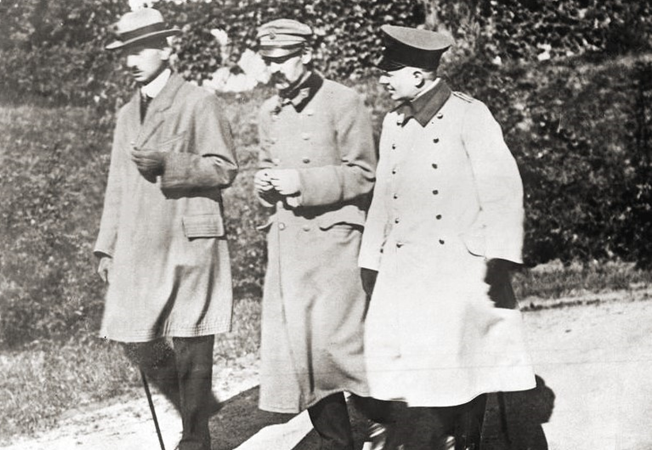Jozef Piłsudski was one of the most outstanding Polish politicians. Contrary to all ideological opinions, this man had an incredible analytical sense that allowed him to anticipate certain decisions on the basis of knowledge and intuition. It was he who was one of, and indeed the main promoter of the thesis that Poland would regain its independence as a result of a global conflict in which the partitioners, who had deprived the Republic of sovereignty at the end of the 18th century, would fight against each other. It was also he who, when World War I broke out, together with his loyal gunners, first sided with the Central Powers, i.e. Austria-Hungary and Germany, only to turn his back on the former allies when the Polish raison d’état demanded it.
Such was the situation in 1917. At that time, Brigadier Piłsudski advised his soldiers not to take the oath of 'faithful brotherhood in arms with Germany and Austria-Hungary’. Many of them heeded this suggestion, which led to the so-called oath crisis. The result of these events was, among other things, Piłsudski’s arrest, and the internment of his riflemen or their being sent to the Austrian army in the camp.
In addition to the brigadier, the Germans detained his closest associate, Kazimierz Sosnkowski. Both men were arrested on 22 July 1917 in Warsaw. They were then taken to Gdańsk, and then to Spandau (then a city near Berlin). On 6th July of that year, i.e. exactly three years after the marching out of Piłsudski’s riflemen from Oleandrów in Kraków to Kielce, the future Marshal of Poland was placed in the Wesel fortress on the Rhine. Rhine. Piłsudski was then imprisoned in the „Stubenhaus” building in the Magdeburg fortress.
Meanwhile, the situation on the First World War front was beginning to look very bad for the Central Powers. The Germans suffered a humiliating defeat at the Battle of Amiens, which turned the balance of power in favour of the Entente states, i.e. France, the United States and Great Britain, among others.
At the same time, Piłsudski’s legend was growing in Polish society. He was portrayed as a Legion Commander, one of the leaders of the Polish Socialist Party, who for years had been trying to win freedom and independence for Poland. In a word, he was becoming the main candidate for the most important political and military posts in the future, already sovereign Poland. This can be confirmed by the words of a Polish member of the German parliament, Wojciech Korfanty – later one of the Marshal’s main political opponents, who stated on 25 October 1918: „I would like to remind you that the man considered by a serious part of the Polish nation to be a national hero, the leader of the Legions, Piłsudski, the man to whom the Polish people entrusted the Ministry of War, despite numerous requests and applications from the Polish authorities is still being held in the fortress in Magdeburg” (23 October 1918. Jozef Piłsudski was appointed Minister of Military Affairs in Jozef Świeżyński’s government, which is why Korfanty referred to the Commandant as 'Minister of War’).
The attempt to get Piłsudski out of internment became at that point one of the most important elements of the game between the Polish leaders, with the Regency Council at their head, and the Germans. Nevertheless, for several days to come, representatives of the Central Powers did not agree to his release, or were willing to do so under certain conditions. The situation changed, however, in the first decade of November 1918. At that time, Austria-Hungary and Germany were unable to conduct hostilities. What is more! Revolution broke out in Germany, leading to a colossal crisis. In view of the above, it was decided to sack Piłsudski, hoping that he would be able to calm the mood in Poland.
On 8 November 1918, both the future leader of the Polish state and Kazimierz Sosnkowski were released by Count Harry Kessler, who recalled that both: „They received the news of their release with courtesy full of dignity à la polonaise”. They then travelled by car to Berlin, where they spent the night. Later, they left for Warsaw by special train. The officers arrived in the Polish capital on 10 November 1918, at 7.30 a.m. Piłsudski was waited on by a dozen or so people, including a member of the Regency Council, Father Zdzisław Lubomirski. Piłsudski’s confidant Adam Koc (Commander-in-Chief of the Polish Military Organisation in Warsaw) recalled Lubomirski’s behaviour as follows: „Prince Lubomirski was very anxious and excited, he repeated several times: 'Finally he is coming, ah, how good! The idea was for me to be the first to greet the Commandant when he got out of the carriage. Soon the train arrived. The Commandant stepped out of it, accompanied by Colonel Sosnkowski. He was pale and obviously exhausted from captivity, but you could see that his strength had not left him. I approached him and greeted him with the words: „Citizen Commandant, in the name of the Polish Military Organisation I welcome citizen Commandant to the capital”. The Commandant saluted me. Prince Lubomirski led him to his car”.
After the greeting, Lubomirski, Koc and Piłsudski went to the former’s flat at Frascati Street in Warsaw. Later, Piłsudski left for the quarters prepared for him, which were on Moniuszki Street. „I spent the whole day [of 10 November] on Moniuszki Street and tried, at least a little, to get acquainted with the situation […] Various delegations were arriving with speeches, and a demonstration was taking place under the balcony, to which I had to go out. And all this was taking place after the wild impressions of my sudden release from Magdeburg […] When, finally, at about ten o’clock in the evening, I forbade anyone to let me in and reflected on the situation in which I found myself in the Polish capital under Beseler’s rule, I decided to leave Warsaw immediately […]” – wrote the leader of the Polish state more than a decade later. Unfortunately, that plan failed, as Piłsudski was visited by a delegation from the German Soldiers’ Council, which was at the head of the German army stationed in and around Warsaw. These soldiers declared themselves ready to submit to the Commandant’s decisions, albeit demanding protection and a safe return to their homeland. The Brigadier agreed to the above, although he then imposed the following conditions on them: surrender of weapons and military equipment, as well as the handover of rolling stock and communications.
In the following days, the Regency Council handed over authority over the Polish Army to Piłsudski, and entrusted him with the mission of forming a government. To that end, the head of the Provisional People’s Government of the Republic of Poland – the socialist Ignacy Daszyński – was brought to Warsaw. The latter arrived in the Polish capital on 14th November 1918, and was received by the Commandant. It was during that meeting that Piłsudski criticised Daszyński with the following words: 'You keep hens, not politics’. In the end, Daszyński was given the mission to form a government, but failed to do so. In view of the above, Jędrzej Moraczewski – Piłsudski’s comrade from the PPS – became Prime Minister, but he managed to form a government. Poland began to regain its independence…

